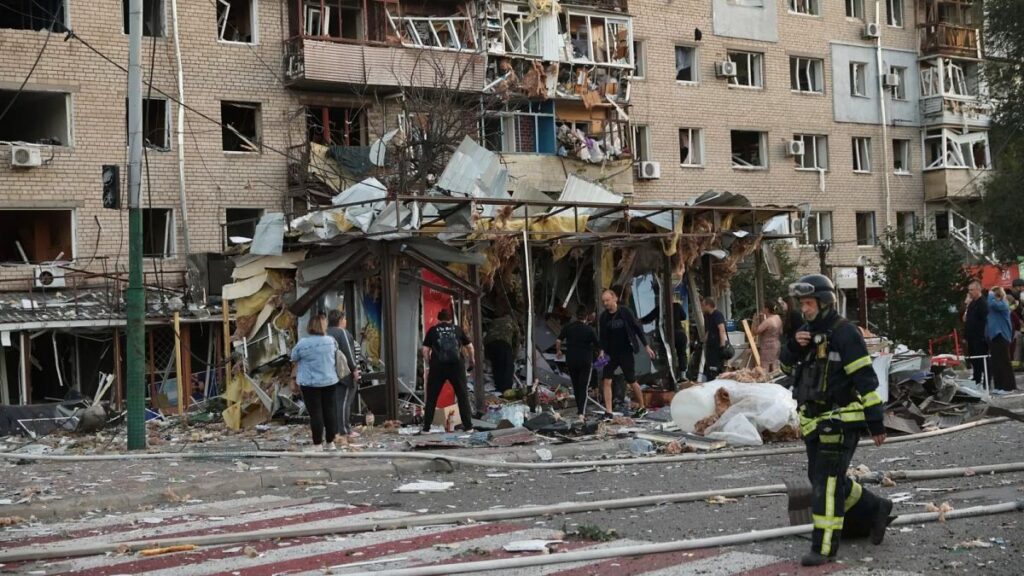In a recent diplomatic initiative, German Foreign Minister Johann Wadephul has called on India to leverage its relationship with Russia to facilitate a return to peace talks concerning the ongoing war in Ukraine. This appeal follows a meeting between Indian Prime Minister Narendra Modi and Russian President Vladimir Putin at a regional summit in China. Wadephul emphasized the need for diplomatic intervention to bring about an end to hostilities, highlighting India’s potential role due to its historical ties with Moscow.
| Article Subheadings |
|---|
| 1) Diplomatic Urgency from Germany |
| 2) India’s Historic Relations with Russia |
| 3) Economic Incentives Amid Political Pressure |
| 4) Efforts for Free Trade Agreements |
| 5) The Road Ahead: India’s Global Role |
Diplomatic Urgency from Germany
During a news conference on Wednesday, Wadephul articulated Germany’s hopes for India to pursue diplomatic channels to de-escalate the conflict in Ukraine. He noted that despite extensive efforts from Europe and the United States, there has been little progress with Russia towards negotiations. “The only demand is that weapons fall silent,” he stated, underscoring the urgency for cessation of hostilities. This commentary positions India as a key player in international diplomacy, given its longstanding relationship with Russia.
India’s Historic Relations with Russia
India has traditionally maintained a robust partnership with Russia, dating back to the Cold War era. This relationship is particularly significant in the realm of defense, with Moscow serving as a primary supplier of military equipment to New Delhi. Since the full-scale invasion of Ukraine by Russia in February 2022, India has faced mounting pressure from Western nations to publicly denounce its ally. Nevertheless, India has chosen a measured approach, continuing its collaboration with Russia while also advocating for an end to hostilities.
The complex geopolitical landscape presents both challenges and opportunities for India. While Western nations view India as a potential mediator for peace talks, they also expect unwavering support against Russia’s actions. India’s balancing act reflects its strategic interests in sustaining a multifaceted foreign policy while navigating the pressures from its traditional allies.
Economic Incentives Amid Political Pressure
While advocating for peace, India is also managing its economic interests, particularly regarding the procurement of discounted Russian crude oil. Unlike Western nations, which have imposed severe sanctions on Russia, India has capitalized on these market conditions to obtain cheap energy supplies. As a result, Russian oil now comprises a significant portion of India’s total imports.
This approach has drawn criticism from the West, especially after the Biden administration imposed an additional 25% tariff on Indian goods, escalating economic tensions. The cumulative tariffs, now totaling 50%, are estimated to impact approximately $48.2 billion worth of Indian exports. As a consequence, India faces the daunting task of shielding its economy while also fostering diplomatic relations.
Efforts for Free Trade Agreements
In light of strained relations with the United States, India is actively seeking to expand its economic alliances with other nations, particularly the European Union (EU). During his talks with Wadephul, Indian Foreign Minister S. Jaishankar emphasized the necessity of expediting discussions for a free trade agreement. Both parties have expressed optimism that a deal could be finalized by the year’s end, which would serve to bolster India’s economic position amidst geopolitical challenges.
The proposed trade agreement aims to reduce tariffs and enhance mutual investment opportunities. This endeavor reflects India’s broader economic ambitions, especially as it seeks to diversify trade partnerships beyond its traditional spheres of influence.
The Road Ahead: India’s Global Role
As international attention turns towards India’s role in the Russia-Ukraine conflict, the country is presented with a unique opportunity to shape its global identity. Should India successfully mediate peace talks or influence a shift in Russia’s stance, it could emerge as a pivotal diplomatic actor on the world stage. However, this potential hinges not only on fulfilling diplomatic expectations but also on balancing the economic repercussions from Western sanctions.
Achieving peace in Ukraine is a complex process that requires cooperation among multiple stakeholders. Wadephul has indicated that Ukrainian President Volodymyr Zelenskyy has shown willingness for dialogue, which adds to the urgency for nations like India to engage. As New Delhi navigates its foreign relations, it carries the weight of being a significant player in the international discourse on peace and stability.
| No. | Key Points |
|---|---|
| 1 | Germany urges India to mediate peace talks with Russia over Ukraine. |
| 2 | India maintains strong relations with Russia, complicating its diplomatic position. |
| 3 | Economic sanctions from the US strain India’s trade relations. |
| 4 | India seeks free trade agreements with the EU to offset economic pressures. |
| 5 | India’s role in peace talks could redefine its global diplomatic identity. |
Summary
The recent appeals by Germany for India to act in facilitating peace talks with Russia highlight the intricate web of international relations shaped by conflict. As India seeks to navigate its historical ties with Moscow and the pressures from Western allies, it must also consider its economic interests and broader ambitions in global diplomacy. The evolving situation presents both challenges and opportunities for India as it works to position itself as a crucial diplomatic actor.
Frequently Asked Questions
Question: What role does India play in the Russia-Ukraine conflict?
India is perceived as a potential mediator due to its historical ties with Russia and its capacity to influence diplomatic discussions.
Question: Why is Germany appealing to India regarding peace talks?
Germany hopes India could leverage its relationship with Russia to encourage a return to negotiations aimed at resolving the war in Ukraine.
Question: How have U.S. tariffs affected India?
The U.S. has imposed significant tariffs on Indian goods, straining economic relations and impacting India’s export capabilities, which has led India to seek alternative trade agreements.


